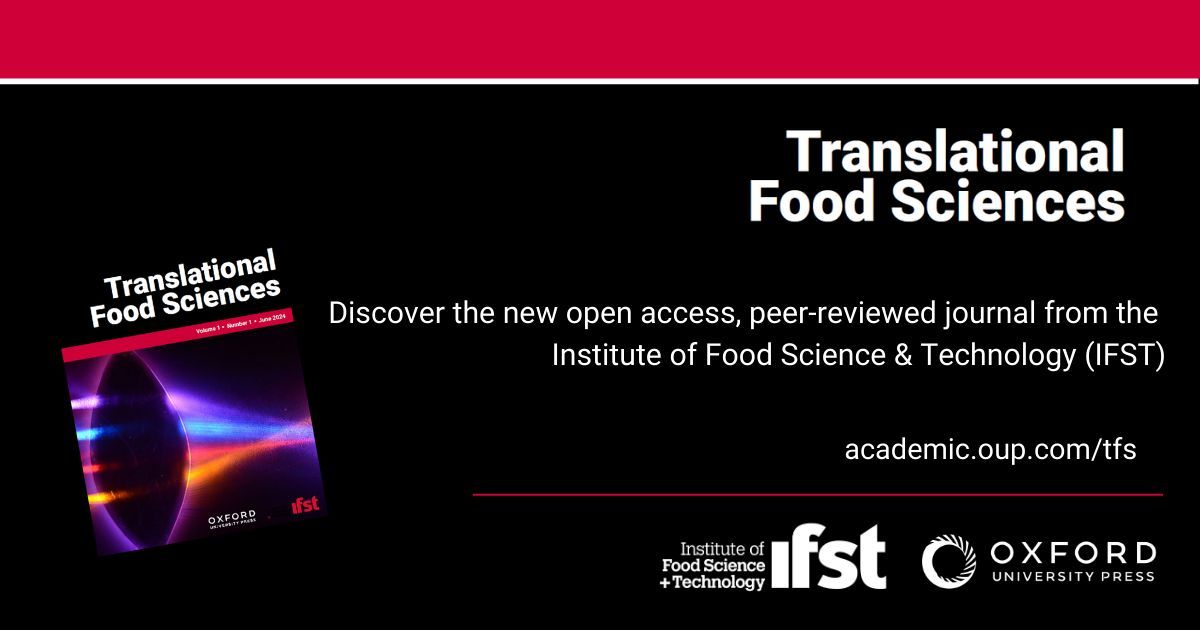
The Institute of Food Science and Technology (IFST) is pleased to announce the launch of a new academic journal, Translational Food Sciences, set to begin publication in January 2025. Published by Oxford University Press (OUP), this journal will be available in Open Access, ensuring that cutting-edge food research is accessible to all.
Translational Food Sciences is designed to serve as a vital platform for applied, near-market, and commercially exploitable food research. Engaging with all aspects and disciplines within the food sphere, this journal is poised to drive genuine progress in the food system by focussing on innovative technologies, new agri-food systems, novel extraction processes, and emerging food trends. The journal will also explore consumer interactions with food, offering unique insights into how food is perceived, consumed, and valued.
Professor Emeritus Niall Young, who will serve as Editor-in-Chief of the new journal, commented “Today, we are thrilled to announce the launch of Translational Food Sciences, a pioneering new journal that embodies the intersection of scientific innovation and real-world authentic, near-market application in the food system. As an Open Access publication under Oxford University Press, this journal will serve as a critical platform for advancing commercially viable food research that addresses the pressing challenges and opportunities in our global food systems. By fostering interdisciplinary collaboration and spotlighting groundbreaking technologies and societal trends, Translational Food Sciences aims to drive tangible progress and influence key policy and regulatory decisions in across the food industry. We invite researchers and practitioners alike to contribute their most impactful work to help shape the future of food.”
The scope of Translational Food Sciences is expansive, covering critical areas such as:
- Food Composition: Exploring traditional, natural, and novel ingredients, nano-sized entities, and their relationship to physical structure, functionality, and sensory perception.
- Food Nutrition: Focusing on nutritional availability, gut health, aging, personalized nutrition, and the impact of food on overall health and wellbeing.
- Food Processing: Investigating advanced techniques like 3D/4D printing, vertical farming, precision fermentation, and the creation of hybrid foods.
- Food Sustainability: Addressing challenges related to food waste, life cycle analysis, carbon footprints, and the valorisation of side streams.
- Food Safety: Tackling issues such as allergen detection, microplastics, shelf-life extension, and food traceability.
- Food Sensory: Delving into the neuroscience of taste, virtual and augmented reality in sensory science, and the development of new texture possibilities.
- Food Policy and Legislation: Analysing the regulatory impact on food application, novel foods, upcycled materials, and food quality management.
- Food Impact: Conducting consumer studies and exploring anthropological perspectives on food.
- Food Packaging: Innovating in sustainable packaging materials, food-packaging interactions, and edible packaging solutions.
A distinctive feature of Translational Food Sciences will be its viewpoint pieces. These articles, grounded in scientific research, will address topical food matters, contributing to important debates and helping to shape regulatory and policy decisions that affect the food industry.
The journal will welcome original research submissions, as well as transfers from its sibling publication, the International Journal of Food Science & Technology. Researchers are encouraged to demonstrate how their findings can be applied in real-world food systems and to consider the broader implications for consumers.
Submissions to Translational Food Sciences should align with the journal’s focus on recent developments and be supported by references published within the last three years. The journal will not consider articles related to clinical or molecular nutrition but will be open to studies on novel process optimisation and product development.
For more information on submission guidelines and the scope of the journal, please visit the Translational Food Sciences website on Oxford University Press.



